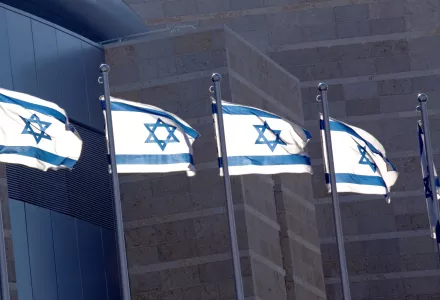The Time Has Come For Statecraft And Diplomacy: Reflections on the First Anniversary of the War In Gaza
Edward Djerejian, Belfer Center Senior Fellow and former U.S. Ambassador to Israel, offers his reflections on the War in Gaza.
Edward Djerejian, Belfer Center Senior Fellow and former U.S. Ambassador to Israel, offers his reflections on the War in Gaza.

The main message of Barbara Tuchman's book The March of Folly: From Troy to Vietnam is that governments and leaders throughout history often pursue policies that are contrary to their country’s own interests, despite clear evidence that such decisions will lead to disastrous consequences. Tuchman explores the concept of "folly," or the deliberate pursuit of irrational or self-destructive actions when viable alternatives exist.
Her work examines how stubbornness, arrogance, misjudgment, and short-term thinking frequently lead rulers and policymakers to make choices that result in failure – through case studies including U.S. involvement in Vietnam. One could add to Tuchman’s case studies wars in Afghanistan and in Iraq, in which there is the common pattern of leaders ignoring warnings, advice, or facts that could have prevented failure, and instead doubling down on misguided actions. In this context the war in Gaza can be considered another March of Folly, with tragic consequences for the parties involved: the Middle East region and the international community.
The horrific attacks by Hamas on Israelis on October 7, 2023, followed by Israel’s all-out military retaliation in Gaza has resulted in massive casualties, destruction and now expansion into another war with Hezbollah in Lebanon. The risk of a wider regional war is ever present. U.S.-led efforts to achieve a sustainable cease fire in Gaza, obtain the release of the Israeli hostages and Palestinian prisoners that would end the fighting and start to alleviate the humanitarian crisis in Gaza have failed.
A massive assistance and political and security stabilization program in Gaza can only be executed in the aftermath of a sustainable ceasefire and a realistic path forward to resolve the Israeli-Palestinian conflict.
The chimera of Israel’s policy led by Prime Minister Netanyahu of deterrence and containment of Hamas collapsed on October 7. Netanyahu has long been playing Hamas against the Fatah leadership in the West Bank to weaken the Palestinian leadership and diminish the prospects for any serious negotiations for peace. Netanyahu has sidestepped the Biden Administration’s diplomatic initiatives on Gaza and Lebanon. He has also not defined the endgame of Israel’s policies in either Gaza or Lebanon beyond military actions, decapitating the Hamas and Hezbollah cadres, “demilitarizing” and “deradicalizing” Gaza, and changing “the balance of power” on Israel’s northern border with Lebanon.
Netanyahu’s policy of prioritizing the Iranian threat to Israel and the region and actively working against U.S. policy on the nuclear issue and the JCPOA initiated in the Obama administration has fallen short. Iran now is technically closer to producing a nuclear weapon and it has been actively influencing regional affairs through its proxies in the so-called “Axis of Resistance.” Indeed, resolving the Palestine issue would do much to marginalize Iran’s and its proxies’ threats to the region by removing a major justification and rallying cry for their policies and actions.
Failed policies should not be supported by the U.S. The current and future U.S. Administration should make clear in word and deed that it will oppose efforts not only to expand the war, but also any efforts to drag it into such a war that may serve the interests of another party but not that of the U.S. That, indeed, would be a major March of Folly.
A determined effort should be made in the remaining days of the Biden Administration and by the new Administration to end the war in Gaza and secure the Lebanese-Israeli border under the aegis of UNSC Resolution 1701, which calls for the full cessation of hostilities between Israel and Hezbollah, the full withdrawal of Israeli forces from all Lebanese territory, the disarmament of armed groups including Hezbollah, and the deployment of the Lebanese Army and UNIFIL forces to southern Lebanon.
As for the central issue of the Israeli-Palestinian conflict, there is no realistic possibility of addressing it constructively while there is a government in Israel that is not seriously committed to negotiations with the Palestinians to end the occupation and to address the core issues of borders, security arrangements, refugees, and Jerusalem. Equally important, the Palestinian Authority and leadership must be renewed to represent the various Palestinian factions and engage in effective negotiations with the Israelis, preferably toward a Two State Solution. To achieve these objectives there will have to be new elections in both Israel and Palestine which, hopefully, will bring to power political forces on both sides that declare their respective visions of peace going forward and their commitment to pursue negotiations on the end of the conflict. Both Israel and the Palestinians will have to recognize the right of self-determination of each other.
In this context, a new U.S. Administration should engage constructively, working with the international community for Arab-Israeli peace. The alternative is continued resort to force and violence by the parties and threats to global stability. The time has come for statecraft and diplomacy.
Statements and views expressed in this commentary are solely those of the authors and do not imply endorsement by Harvard University, the Harvard Kennedy School, or the Belfer Center for Science and International Affairs.
Djerejian, Edward. “The Time Has Come For Statecraft And Diplomacy: Reflections on the First Anniversary of the War In Gaza.” Belfer Center for Science and International Affairs, October 15, 2024